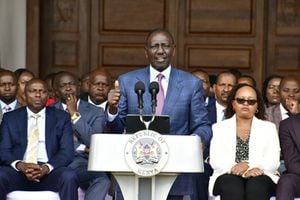Prime
Transitional Justice activists demand accountability for conflicts, wars in Uganda

Left in ruins: Police and journalists tour the Omusinga’s palace at Buhikira after the attack that claimed more than 100 lives on December 01, 2016. PHOTO/FILE/ABUBAKER LUBOWA.
What you need to know:
- The report dubbed “All We Need Are Answers: Prevailing Transitional Justice Issues and Actors in Uganda”, mainly cites two conflicts of the Lord’s Resistance Army (LRA) and the 2016 Kasese Palace attack that left over 100 locals killed by security forces.
A new report by transitional justice groups- urges government to provide answers and accountability to the people who were affected by several armed conflicts in various parts of the country- if healing is to be realized.
The report dubbed “All We Need Are Answers: Prevailing Transitional Justice Issues and Actors in Uganda”, mainly cites two conflicts of the Lord’s Resistance Army (LRA) led by Joseph Kony and the recent Kasese massacre that left at least 100 locals killed by government security forces.
“Stakeholders in both regions (Northern Uganda and Rwenzori) decried the lack of accountability for grave human rights violations against citizens and the high levels of impunity by perpetrators of violence/conflict,” a report released at the weekend in Kampala, quotes one of the Kasese Massacre widows.
Adding:“In the Rwenzori region, victims highlighted what many commonly refer to as the ‘Kasese massacre’- the 2016 intervention at the palace of the Rwenzururu king Charles Wesley Mumbere and expressed concern that no one has been held accountable for the deaths that occurred at the palace. Many women were rendered widows with orphans. Who do we run to for accountability?”
In November 2016, a joint army and police operation, under the command of the current commander of the Land Forces, Lt Gen Peter Elwelu, raided Buhikira Royal Palace, arresting King Mumbere and close to 200 other people.
Justifying the raid, government explained that it was a response to militant attacks on police posts in the region two weeks earlier, allegedly perpetrated by the royal guards.
King Mumbere was charged before Jinja Magistrate’s Court in December 2016 together with 201 others but five of them have so far died in prison.
Whereas the king, his former acting prime minister, Mr Johnson Thembo Kitumbire, and six juveniles are out on bail, a number of his co-accused and loyalists remain in jail.
Turning to the two-decade armed LRA conflict, the transitional justice activists say that despite the International Criminal Court’s (ICC) recent conviction and sentencing of Dominic Ongwen to 25 years in jail for his role in committing atrocities in Northern Uganda, the war victims demand for more.
“There were so many parties involved in the LRA war, government inclusive. How do we ensure accountability for crimes committed by government soldiers?” The report further quotes one of the victims of the LRA armed rebellion conflict.
Another LRA victim from Atiak, Amuru Distritc only identified as Irene says: “Without giving accountability of what exactly happened to the citizens of Uganda, there won’t be fair justice…all we need is answers.”
Selective pursuit for justice was another finding that the respondents highlighted in regard to demand for accountability in conflict areas.
The report extensively states that many stakeholders engaged during the meetings- felt that a number of perpetrators of grave human rights’ violations have been left free partially because of their ties to the current National Resistance Movement (NRM) regime.
“Yes, we have seen some of the LRA commanders like Dominic Ongwen and Thomas Kwoyelo, ADF’s Jamil Mukulu and the Omusinga Charles Wesley Mumbere paraded before courts of law, but how about the UPDF commanders who were known for committing certain atrocities and the information is known.” the report states in part.
Mr Francis Opio, the Program Manager for Rwenzori Forum for Peace and Justice said findings of the report indicate that beyond formal prosecution-- as one of the forms of accountability-- victims decry the way nobody considers physical and mental damages inflicted on them at the time of conflicts



